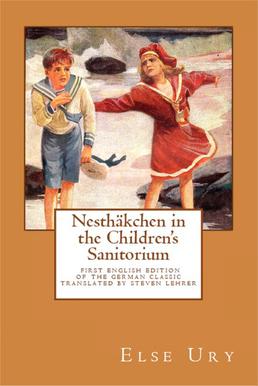Nesthäkchen in the Children's Sanitorium
Nesthäkchen in the Children's Sanitorium is the fourth book in the Nesthäkchen series, written by German author Else Ury. The series follows the life of a young girl named Annemarie Braun, affectionately known as Nesthäkchen, as she grows up in early 20th century Germany. This particular book focuses on Annemarie's experiences in a children's sanatorium.
Plot Summary[edit | edit source]
The story begins with Annemarie Braun, who is now a young schoolgirl, falling ill with a serious illness. Her parents, Dr. Ernst Braun and Elsbeth Braun, decide to send her to a children's sanatorium to recover. The sanatorium is located in a picturesque area, surrounded by nature, which is believed to aid in the healing process.
At the sanatorium, Annemarie meets other children who are also there to recuperate. She forms close friendships with some of them, including a girl named Lotte and a boy named Hans. The children engage in various activities designed to improve their health, such as outdoor games, walks in the forest, and healthy meals.
Throughout her stay, Annemarie learns valuable lessons about resilience, friendship, and the importance of health. She also receives letters from her family, which help her stay connected to her life back home. By the end of the book, Annemarie has made a full recovery and returns home with a renewed sense of vitality and appreciation for life.
Characters[edit | edit source]
- Annemarie Braun - The protagonist of the series, a young girl known as Nesthäkchen.
- Dr. Ernst Braun - Annemarie's father, a physician.
- Elsbeth Braun - Annemarie's mother.
- Lotte - A girl Annemarie befriends at the sanatorium.
- Hans - A boy Annemarie befriends at the sanatorium.
Themes[edit | edit source]
The book explores several themes, including:
- The importance of health and wellness.
- The value of friendship and support during difficult times.
- The healing power of nature.
- The resilience of children in the face of illness.
Background[edit | edit source]
Else Ury was a popular author of children's literature in Germany. The Nesthäkchen series is one of her most well-known works, beloved by generations of readers. The series provides a glimpse into the life and culture of early 20th century Germany, with a focus on the experiences of young girls.
Reception[edit | edit source]
Nesthäkchen in the Children's Sanitorium was well-received by readers and critics alike. It is praised for its engaging storytelling, relatable characters, and positive messages about health and friendship.
Legacy[edit | edit source]
The Nesthäkchen series remains a classic in German children's literature. It has been reprinted numerous times and continues to be enjoyed by new generations of readers. The series has also been adapted into various media, including television and radio plays.
See Also[edit | edit source]
References[edit | edit source]
External Links[edit | edit source]
Translate: - East Asian
中文,
日本,
한국어,
South Asian
हिन्दी,
தமிழ்,
తెలుగు,
Urdu,
ಕನ್ನಡ,
Southeast Asian
Indonesian,
Vietnamese,
Thai,
မြန်မာဘာသာ,
বাংলা
European
español,
Deutsch,
français,
Greek,
português do Brasil,
polski,
română,
русский,
Nederlands,
norsk,
svenska,
suomi,
Italian
Middle Eastern & African
عربى,
Turkish,
Persian,
Hebrew,
Afrikaans,
isiZulu,
Kiswahili,
Other
Bulgarian,
Hungarian,
Czech,
Swedish,
മലയാളം,
मराठी,
ਪੰਜਾਬੀ,
ગુજરાતી,
Portuguese,
Ukrainian
Navigation: Wellness - Encyclopedia - Health topics - Disease Index - Drugs - World Directory - Gray's Anatomy - Keto diet - Recipes
Search WikiMD
Ad.Tired of being Overweight? Try W8MD's physician weight loss program.
Semaglutide (Ozempic / Wegovy and Tirzepatide (Mounjaro / Zepbound) available.
Advertise on WikiMD
WikiMD is not a substitute for professional medical advice. See full disclaimer.
Credits:Most images are courtesy of Wikimedia commons, and templates Wikipedia, licensed under CC BY SA or similar.Contributors: Prab R. Tumpati, MD



